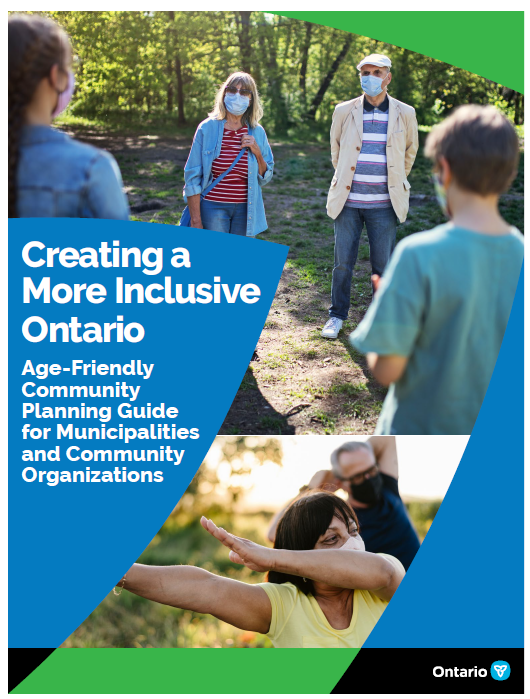Age-Friendly Communities can help create more accessible environments for people of all ages, abilities and backgrounds. The World Health Organization has identified eight overlapping domains of community life that affect an individual’s personal wellbeing and their independent and active living in physical and social environments.

Physical environment
1. Outdoor spaces and public buildings - When people view a neighborhood as safe and accessible, it encourages people to participate in outdoor activities and engage with the community. Accessibility involves removing barriers that limit opportunities for people with disabilities, including older adults with age-related limitations and/or disabilities.
2. Transportation - The condition and design of transportation-related infrastructure, such as signage, traffic lights and sidewalks affect personal mobility. Access to reliable, affordable public transit becomes increasingly important when driving becomes stressful, challenging or is no longer available as an option.
3. Housing - Housing options that are affordable, accessible, supportive and incorporate flexibility through adaptive features, style and location choices are essential for age-friendly communities.
Social environment
4. Social participation - Social participation involves the level of interaction that older adults and people with disabilities have with other members of their community and the extent that the community makes this interaction and inclusion possible.
5. Respect and social inclusion - Community attitudes, such as a general feeling of respect and recognition of the role that older adults and people with disabilities play in our society, are critical factors for establishing an inclusive and age-friendly community.
6. Civic participation and employment – Civic engagement includes the desire to be involved in aspects of community life that extend beyond day-to-day activities, such as:
- volunteering
- becoming politically active
- voting
- working on committees.
The ability to continue working or find new employment provides economic security for older adults, and people of all ages and abilities. This includes having access to accessible environments, including accessible workplaces.
Personal well-being
7. Community support and health services - Access to, and awareness of, mental and physical health programs and services contribute to quality of life and age-friendliness.
8. Communication and information - Age-friendly communities provide readily accessible information about community events or important services in formats that are appropriate for older adults and people with disabilities. An age-friendly community recognizes the diversity of its population and promotes initiatives to reach as many people as possible.
These eight domains are the basis for the steps outlined in the Age Friendly Community Planning Guide for Municipalities and Community Organizations
This guide combines emerging research with what Ontario communities have learned from their age-friendly community initiatives. It offers a comprehensive approach to planning, implementing and evaluating community programs and provides information and resources to support municipalities in each step in the process below:
The guide also has information on how to maintain momentum and sustain success, with a table summarizing the factors that successful age-friendly community initiatives in Ontario have identified as contributing to sustainability.
Wonder what communities are designated as age friendly? The Ontario Interactive AFC Maps showcase the age-friendly community initiatives (AFCIs) and activities being implemented across Ontario. The maps are updated on a regular basis and include information about current AFCIs, age-friendly activities across the eight domains, and organizations/agencies related to age-friendly principles. The maps were designed to help spread promising practices and create opportunities for collaboration.
If your municipality is interested in working towards the principals of an age friendly community, or would like more information on contact Lorna Desmarais at lorna.desmarais@neph.ca or 1-877-442-1212, Ext. 2239.

Community Services Guides
20230131/ld:nd